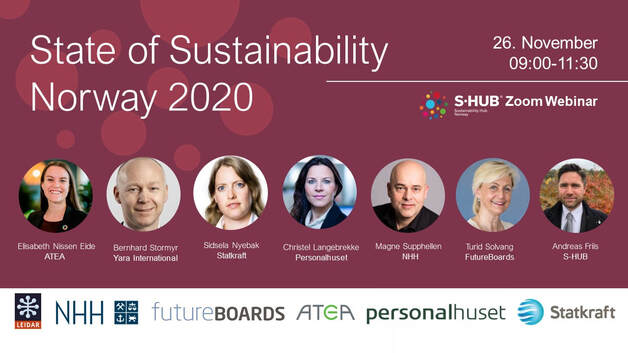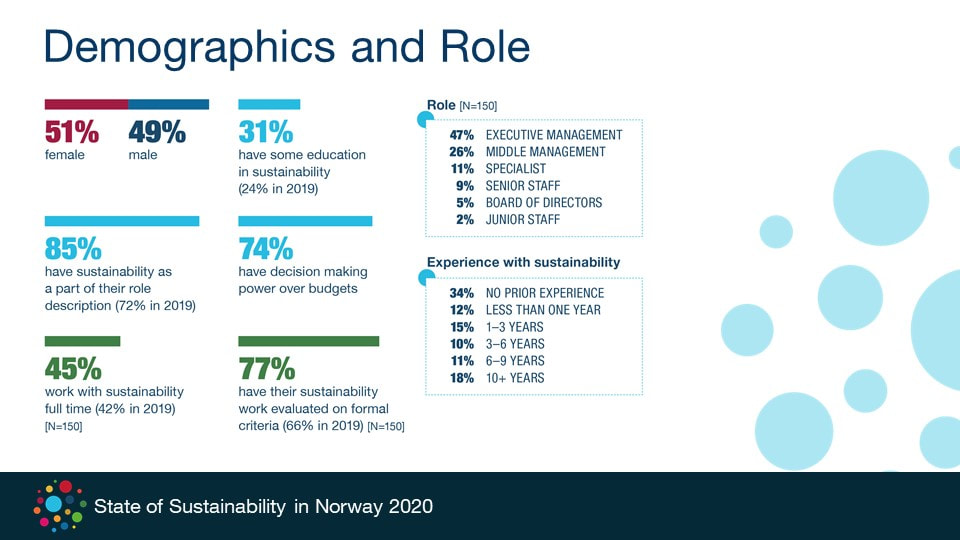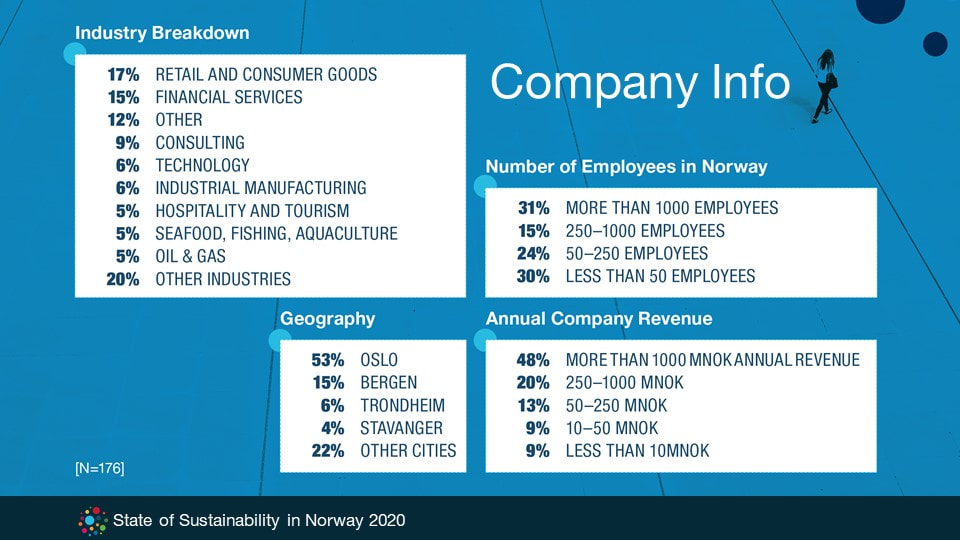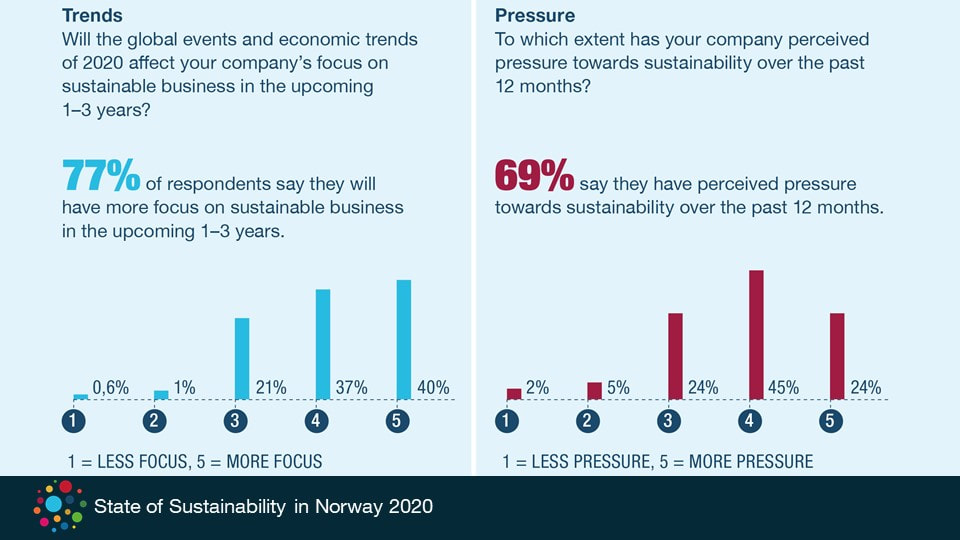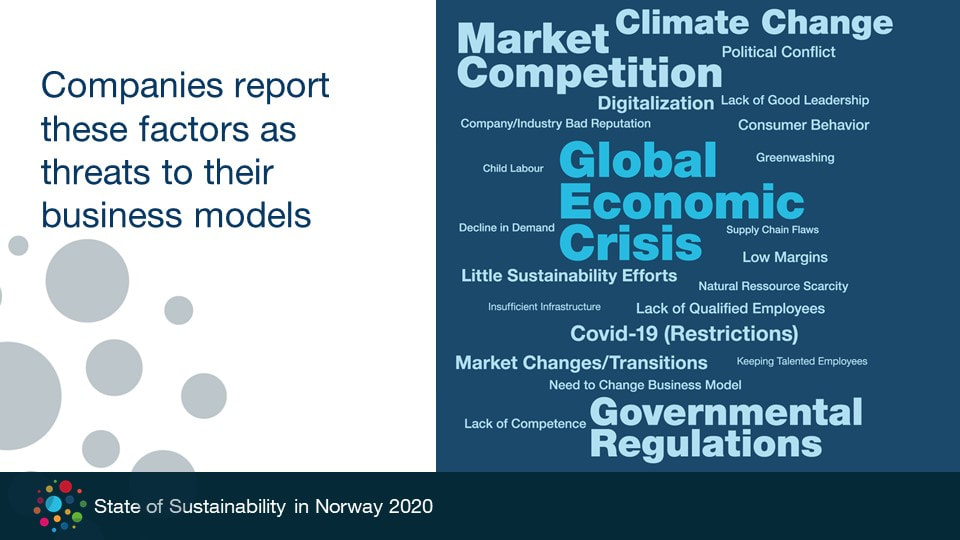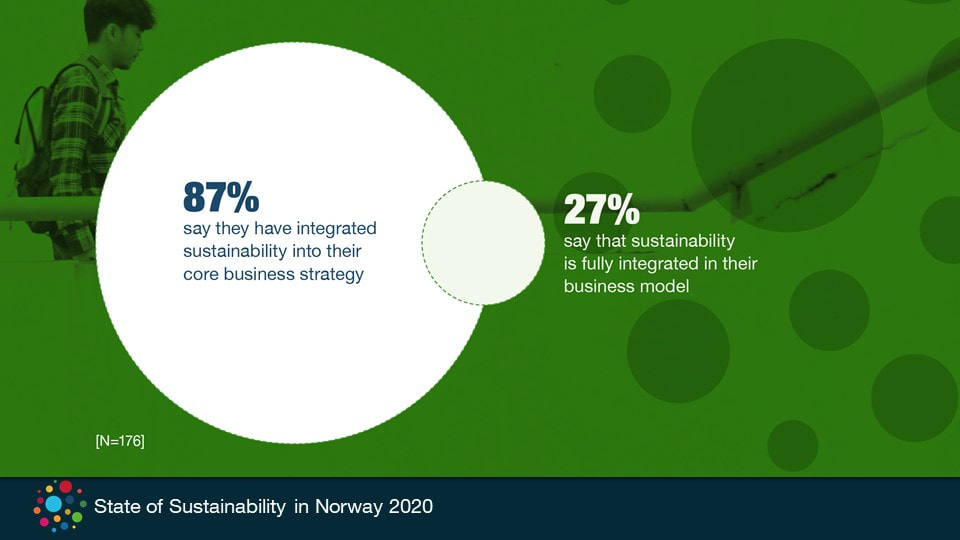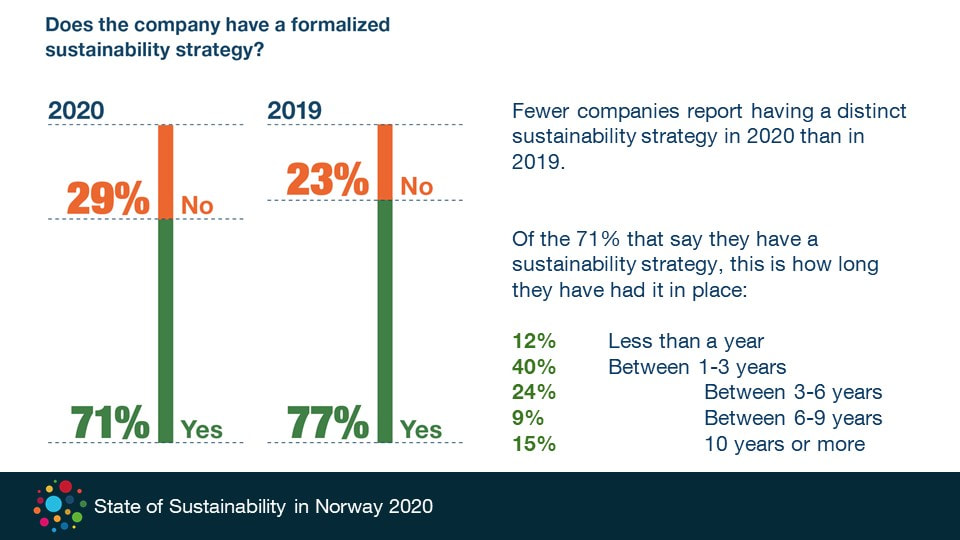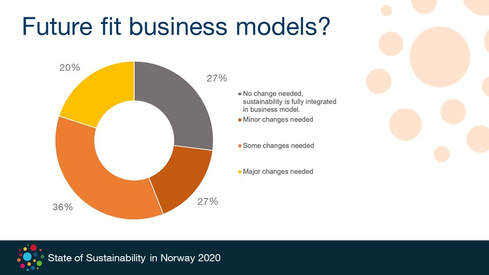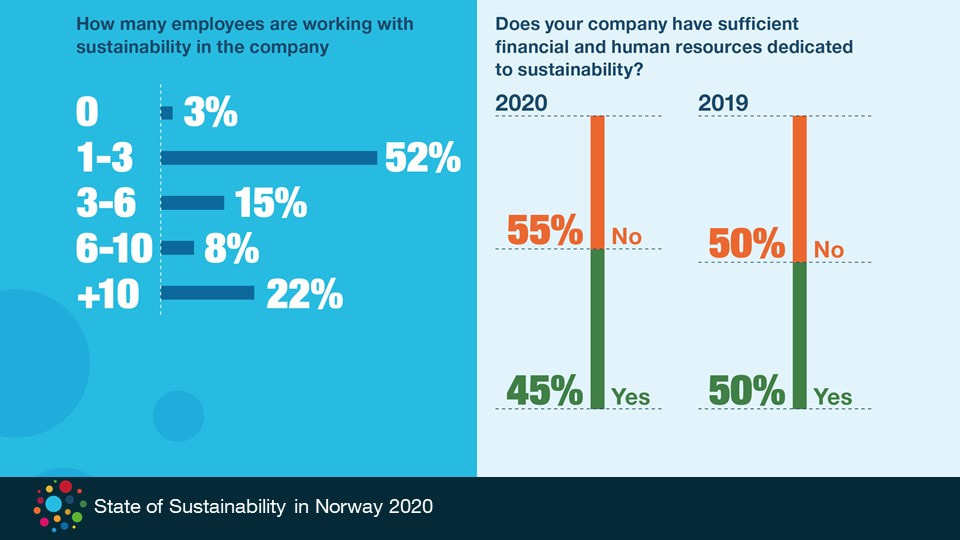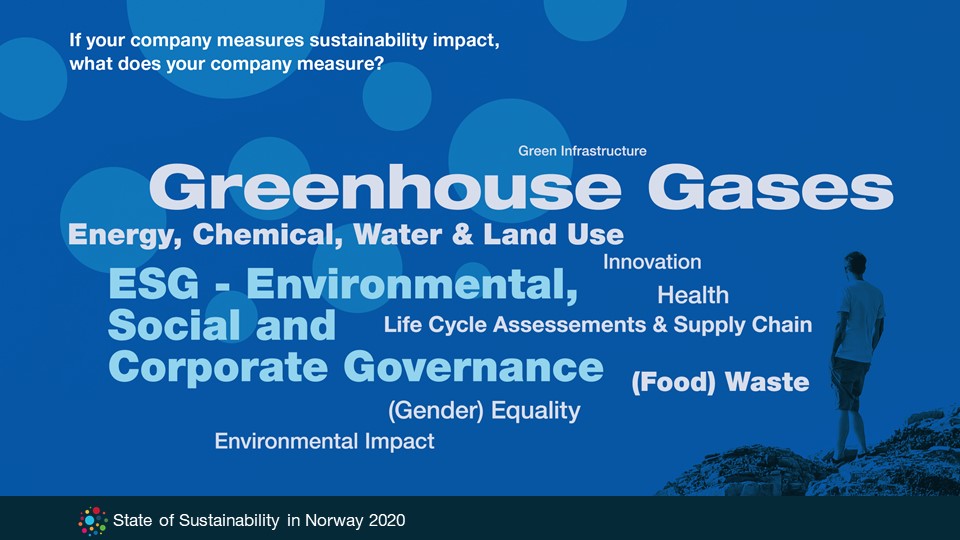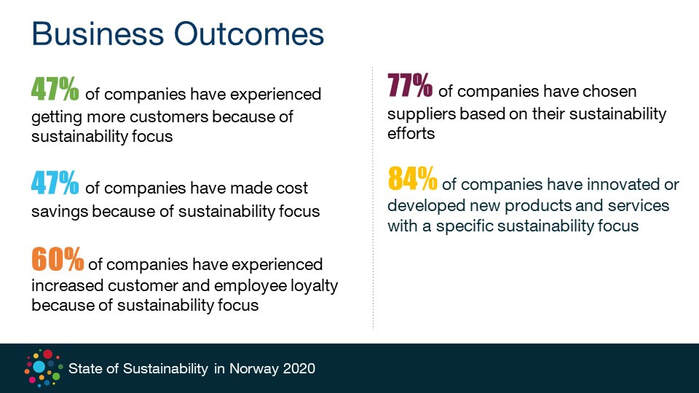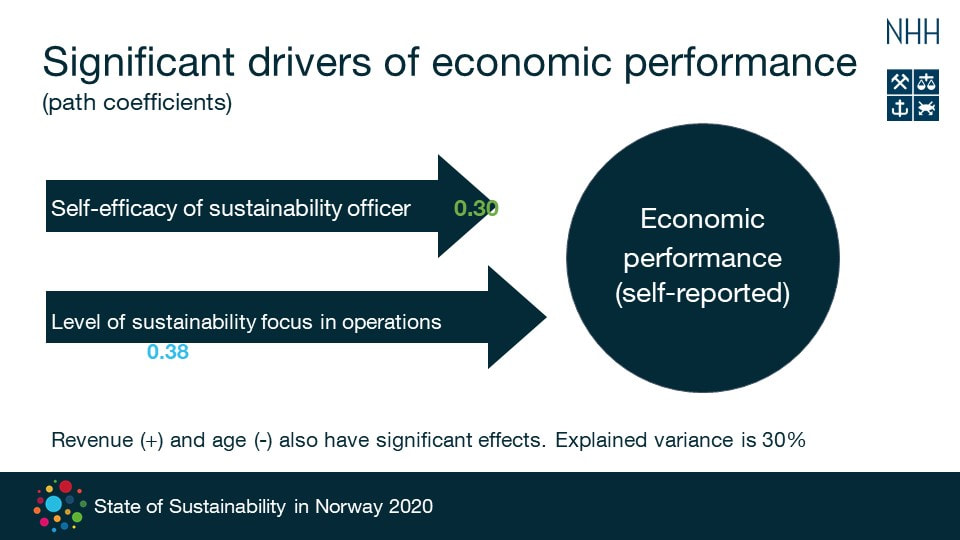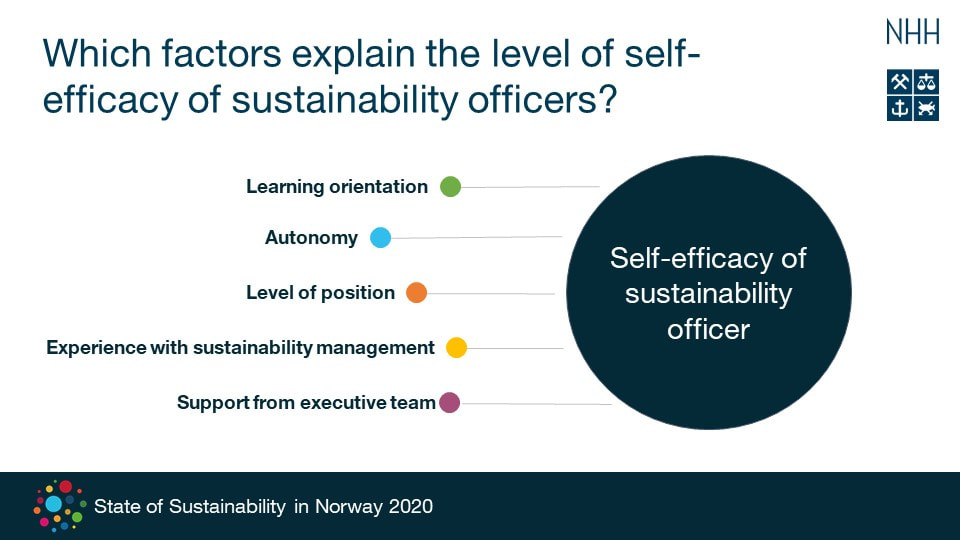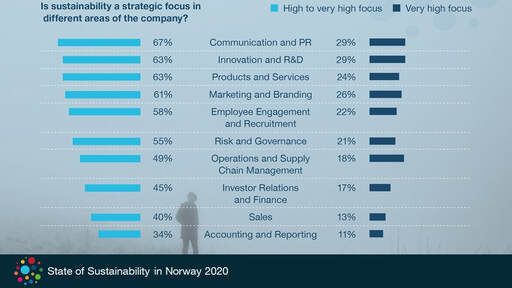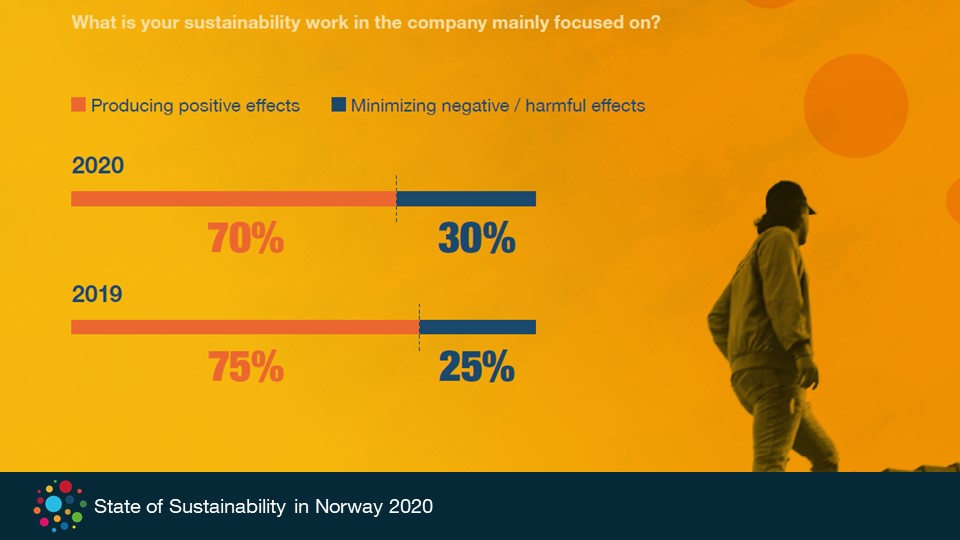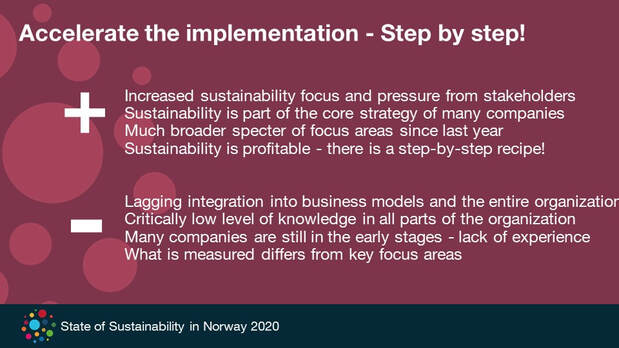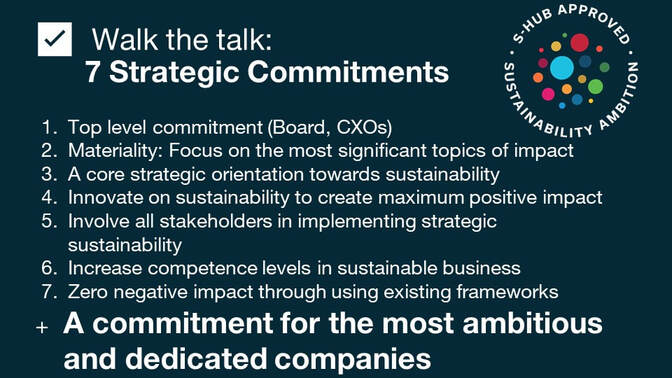Introduction
More than 200 professionals from around the globe recently gathered online to explore the key findings from the State of Sustainability Norway 2020 report, which surveys how 176 leading Norwegian companies work with sustainability.
More than 200 professionals from around the globe recently gathered online to explore the key findings from the State of Sustainability Norway 2020 report, which surveys how 176 leading Norwegian companies work with sustainability.
|
Opening Sustainability Hub's State of Sustainability Norway 2020 seminar, its Executive Director Andreas Friis, said, “Today’s future-fit companies understand that we need to completely transform how we do business to navigate in the emerging landscape. Welcome to an exploration of the main correlations we have discovered between sustainability and profit!”
The seminar was organized by Sustainability Hub Norway and featured insights from FutureBoards, Statkraft, ATEA, Yara International, Norwegian School of Economics (NHH) and Personalhuset Norway. The data was analysed in collaboration with NHH and the report is designed in collaboration with Leidar. |
For the third consecutive year, State of Sustainability Norway looks at the sustainability efforts of Norwegian companies to assess the Norwegian business sector’s progress towards sustainable practices. The findings in the report, which will be available in January 2021, are from a survey in which 176 respondents answered 77 questions. Preselected based on last year’s survey and the Sustainability Hub network, the respondents either worked specifically with sustainability or with sustainability as a part of their overall job description. The report may therefore be biased to include more companies actively working with sustainability than are proportionally present in the Norwegian business landscape.
Strategies Must Follow High Ambitions
Andreas Friis walked participants through some of the survey’s findings. He noted how Norwegian companies considerably increased their level of ambition regarding sustainability during the past year, as pressure from stakeholders increased. He also explained that 77% expecting to focus more on sustainability in the future reflects the global move of capital towards investing in sustainable businesses, which offer lower risk.
Andreas Friis walked participants through some of the survey’s findings. He noted how Norwegian companies considerably increased their level of ambition regarding sustainability during the past year, as pressure from stakeholders increased. He also explained that 77% expecting to focus more on sustainability in the future reflects the global move of capital towards investing in sustainable businesses, which offer lower risk.
Andreas mentioned how this pressure seems to come mostly from international regulations, but also from customers, investors and employees – and surprisingly little from financial institutions. Explaining that Sustainability Hub finds it promising that 87% of respondents say their company has integrated sustainability into core business strategy, a large increase from the previous report, he also noted that only 27% of strategies are fully integrated into business models, calling this “part of the implementation challenge”.
In fact, 7 out of 10 companies indicate that they have to make changes to their business model in order to integrate sustainability by 2030.
Drilling into the factors influencing this “implementation challenge”, Andreas suggested that slow implementation is partly due to a relatively low level of competence in sustainable business. Only 14% say they have a very high competence on sustainability in their management team and 10% within the board and only 31% of sustainability officers have formal education.
He also intimated that the situation is compounded by a lack of resources and narrowly focused strategies (e.g. solely on climate). Concluding that sustainability is still an immature field in Norwegian business, Andreas urged the community to push towards holistic sustainability strategies. Ending on a brighter note, he underlined how almost 50% of the companies say they get more customers and save costs due to sustainability, with 60% getting more engaged customers and employees, saying “We believe that this shows sustainability with the right focus clearly contributes to increased profits.”
Sustainability is Good for Business
Magne Supphellen, Professor at the Norwegian School of Economics, supported this view, saying that the survey suggests, "a positive relationship between the extent of strategic focus on sustainability in operations and economic performance."
He also explained that the findings suggest, "Companies with a culture that is open to learning and change are better at integrating sustainability in operations,” and how, “These companies also score higher on trustworthiness of sustainability communication," underpinning this with, "Sustainability regulations and external pressure from the government, NGOs and the media lead to less green-washing.”
Furthermore, Magne described how the survey’s findings indicate the importance of sustainability officers who are confident in their ability to improve sustainability and influence the mindset of top management. This is vital for implementation and seems to correlate with improved economic performance.
Ensure Buy-in at Board and C-level
Christel Langebrekke, Country Manager at Personalhuset Norge, explained how the recruiting sector is seeing an increased push towards sustainability from customers, while also being challenged by start-ups to change fast in terms of sustainability, professionalism and digitalisation. Personalhuset Norge employees are keen to engage with sustainability, with 55% of them wanting to be involved in the company’s efforts. Christel described how “Our process began with selecting four SDGs, which helped us to then create a sustainability strategy and business model. We are now exploring how to integrate sustainability throughout the organization and to do reporting.” She also underlined how support from top management and the board has proven vital to their sustainability journey to date.
Turid Solvang, Founder & CEO of FutureBoards, echoed this when stating her concern that “only 10% of respondents think their board has very high competence in this field. At the same time, almost 80% believe that there will be more focus on sustainability in the next few years. This means that either the level of sustainability competence among existing board members must be raised significantly and quickly, or new faces and ideas must enter the boardrooms. Possibly both. It is not the case that board members must be sustainability experts, but they must know enough to ask the right and critical questions.”
She also considers it the responsibility of board directors and top management to have an overarching agenda for sustainable value creation. This is an expectation for the Norwegian State’s direct ownership in companies that was underlined in its latest white paper. Other speakers suggested that a complete board member mind-set change, from focusing on values for shareholders to total societal value creation, is on the cards.
Commenting on the results in relation to reporting, Turid questions if boards take responsibility for sustainability reports in the way they do when signing the annual financial report and the board's report. She cites Professor Mervyn King, founder of GRI and the International Integrated Reporting Council: “While the financial statements are critical - but not sufficient - the sustainability report is meaningless without numbers. Continuing to report in two silos is divorced from reality.”
Christel Langebrekke, Country Manager at Personalhuset Norge, explained how the recruiting sector is seeing an increased push towards sustainability from customers, while also being challenged by start-ups to change fast in terms of sustainability, professionalism and digitalisation. Personalhuset Norge employees are keen to engage with sustainability, with 55% of them wanting to be involved in the company’s efforts. Christel described how “Our process began with selecting four SDGs, which helped us to then create a sustainability strategy and business model. We are now exploring how to integrate sustainability throughout the organization and to do reporting.” She also underlined how support from top management and the board has proven vital to their sustainability journey to date.
Turid Solvang, Founder & CEO of FutureBoards, echoed this when stating her concern that “only 10% of respondents think their board has very high competence in this field. At the same time, almost 80% believe that there will be more focus on sustainability in the next few years. This means that either the level of sustainability competence among existing board members must be raised significantly and quickly, or new faces and ideas must enter the boardrooms. Possibly both. It is not the case that board members must be sustainability experts, but they must know enough to ask the right and critical questions.”
She also considers it the responsibility of board directors and top management to have an overarching agenda for sustainable value creation. This is an expectation for the Norwegian State’s direct ownership in companies that was underlined in its latest white paper. Other speakers suggested that a complete board member mind-set change, from focusing on values for shareholders to total societal value creation, is on the cards.
Commenting on the results in relation to reporting, Turid questions if boards take responsibility for sustainability reports in the way they do when signing the annual financial report and the board's report. She cites Professor Mervyn King, founder of GRI and the International Integrated Reporting Council: “While the financial statements are critical - but not sufficient - the sustainability report is meaningless without numbers. Continuing to report in two silos is divorced from reality.”
Business, Government and Society Aligned
|
Sidsela Nyebak, VP Group Sustainability at Statkraft, addressed the issue of how implementing sustainability remains the main challenge, despite it being most important for improving business performance. She mentioned the role of clearer legislation in “helping to put risk management and compliance more in focus, in contrast to focusing on ambitions and goals, which are mainly reflected in PR and marketing.”
Sidsela also stated that a more strategic focus helps to balance the reality of sustainability work being resource intensive. Furthermore, she suggests that the struggle to increase the ambition level and to drive implementation of sustainability is also reflected nationally in Norway, citing how the country’s audit agency (Office of the Auditor General) has an just criticized the government’s lack of focus on the SDGs in its policies. |
Bernhard Mauritz Stormyr, VP Sustainability Governance at Yara, explained how the broader issue of sustainable value creation was also apparent in Yara’s current, key sustainability-related dialogues: with national authorities on regulations and with financial institutions on green loans. Bernhard was surprised by the survey’s indication of many companies’ relatively narrow focus, saying “Of course climate is important, but what about issues such as employee safety, human rights, corruption and diversity – as suggested by the Global Compact principles? Continuing, he pointed out that few companies actually measure these elements of sustainability and how a lack of external auditing of sustainability reports leaves considerable room for improvement.
|
Elisabeth Nissen Eide, Head of Sustainability & Compliance at Atea Norge, explained how the company has a sustainability strategy and goals in place and is now working to integrate and implement them. She also emphasized how, as an IT infrastructure supplier, Atea is “well aware that technology has the potential to push the sustainability agenda 22% faster.” Elisabeth was particularly pleased to note the survey’s finding that companies had changed focus towards positive external impacts (70%) in contrast to their negative footprint effects.
In response to the findings on a lack of sustainability competence at various levels in organisations, she believes that all staff having some knowledge is better than having just a few knowledgeable experts. With this in mind, Elisabeth urged educational institutions to “incorporate sustainability into all types of academic studies, instead of limiting it to dedicated courses.” |
From Raised Ambitions to Concerted Action
Reflecting upon the findings from the State of Sustainability Norway 2020 report, Sustainability Hub's Executive Director, Andreas Friis, concluded that Norway’s business community “…must increasingly convert high-level ambitions into concerted actions, accelerating the implementation of sustainability throughout organizations and operations.”
He called for new sustainable business models to integrate sustainability fully into business by 2030, and said his organization was pleased to see “a shift in mindset, with business leaders understanding that today's best practices are not enough and that there is substantial room for improvement.” The survey’s findings indicate that in order to develop a sustainable business model, companies need the right competence and an internal strategic focus on sustainability. Andreas therefore urged participants to “invest time and resources in your employees and give them a clear mandate to make change happen".
He called for new sustainable business models to integrate sustainability fully into business by 2030, and said his organization was pleased to see “a shift in mindset, with business leaders understanding that today's best practices are not enough and that there is substantial room for improvement.” The survey’s findings indicate that in order to develop a sustainable business model, companies need the right competence and an internal strategic focus on sustainability. Andreas therefore urged participants to “invest time and resources in your employees and give them a clear mandate to make change happen".
In conclusion, Andreas posed two questions: what the top sustainability performers are doing differently, and how that knowledge can be used to create a “race to the top”. In light of this, he revealed Sustainability Hub’s new “Strategic Stamp of Approval” – seven strategic commitments designed to raise the corporate sustainability bar.
Contact Andreas Friis - [email protected] to hear more about Sustainability Hub’s “Strategic Stamp of Approval”.
The State of Sustainability Norway 2020 survey findings will be available in January. Get your copy from www.sustainabilityhub.no.
Additional Resources
- Access the State of Sustainability Norway 2020 findings here
- Norwegian article on the survey findings here
- Atea's Sustainability Plan
- Yara's GRI Report 2019
- Statkraft Sustainability report 2019
- Norwegian School of Economics (NHH) Annual report
|
About the author:
|
Kevin Reeder is driven by two com-passions: Sustainability and Awareness. As Storytelling Consultant at Sustainability Hub Norway he identifies, develops and communicates conversations and narratives vital for supporting sustainable and ethical business. Kevin has 25 years experience as a corporate storyteller, content strategist and copywriter. He is also Founder & Awareness@Work/Wellbeing Consultant at MindLAB Oslo. |

